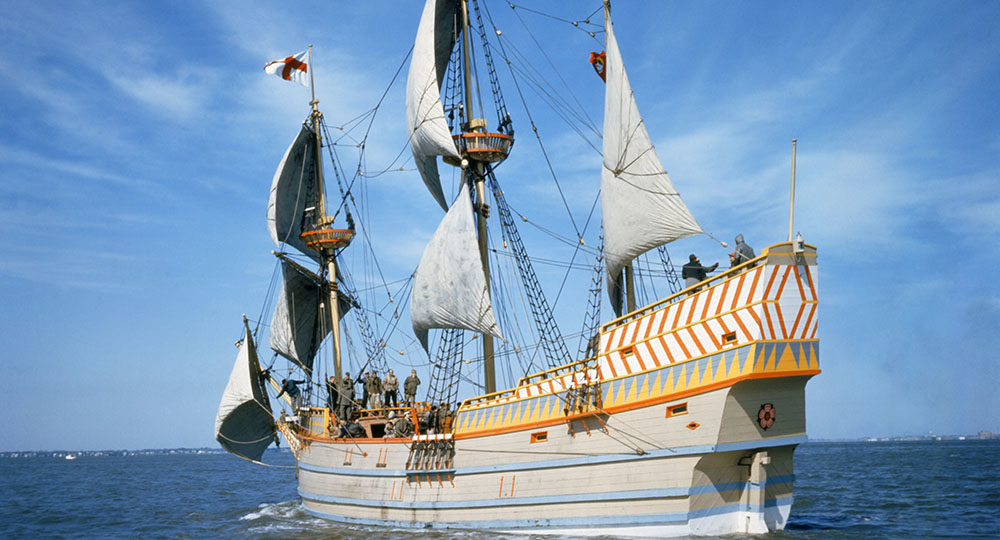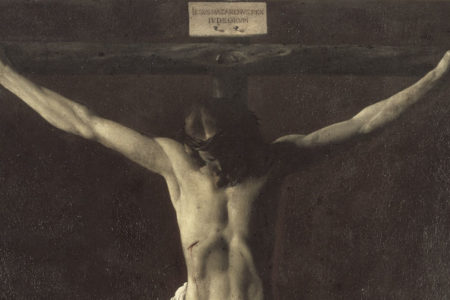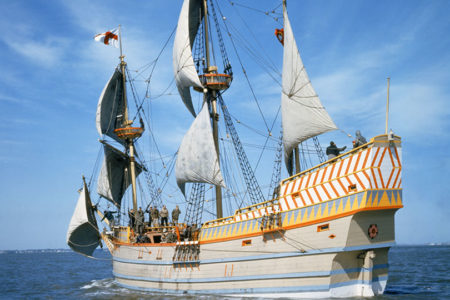Saved by Amazing Grace: The Story of John Newton
When John Newton composed the words to what has perhaps become the most widely recognized hymn of our day— “Amazing Grace”—he was the pastor of a growing congregation in Olney, England. Newton loved the country setting. He had a loving wife, a thriving ministry, and pleasant surroundings. Life was good. But 25 years earlier, John Newton’s life had been a wreck.
Newton was born in London on July 24, 1725. His father, a merchant-ship captain, loved John but was stern and aloof. John’s mother, on the other hand, was attentive and nurturing. She taught him Scripture—entire chapters at a time—along with hymns and poems. Unfortunately, John’s mother died two weeks before his seventh birthday, and his father remarried shortly afterward.
When the new couple had a son of their own, they centered their affections more on him than on John, and John drifted into the company of nefarious boys and learned their nasty ways. At age 11, he took the first of five sea voyages with his father, learning quickly to swear and curse with the best of sailors.
Over the next five years, however, John occasionally was forced to reflect seriously on the condition of his soul. Once he barely missed boarding a war-ship carrying a friend, only to learn later that the ship had overturned and his friend and several others had drowned.
About this time, Newton also had a disturbing dream in which he threw away a ring representing all of the mercy God had in store for him. These experiences greatly convicted Newton’s conscience, prompting him temporarily to take spiritual matters more seriously. But after a few days, he quickly forgot what had caused his sobriety, and he continued his downward spiral into wickedness. Newton said, “I often saw the necessity of religion, as a means of escaping hell; but I loved sin, and was unwilling to forsake it.”1
At 19 Newton was forced to enlist as a midshipman on the HMS Harwich. He later deserted and was caught, placed in irons, publicly stripped on board the ship, whipped with a cat-o’-nine-tails, and demoted. Newton then fell into dark depression and despair, wanting at times to throw himself overboard and scheming of ways to murder the captain who had humiliated him. His situation soon changed, however, when his captain swapped him for sailors from a ship bound for West Africa to procure slaves.
Slave-Trading Days
The slave trade was a lucrative business in the mid-1700s. More than 100,000 slaves came to the New World on English ships.2 Wrote William E. Phipps: “The average death rate of slaves on the middle passage [from Africa to port of sale in the Caribbean or North America] in English ships in the eighteenth century was about fifteen percent.”3 Approximately 15,000 Africans died at sea as slaves on English ships during this time.
In his new environment, Newton did nothing to endear himself to the ship’s officers. He concocted a little ditty ridiculing the captain and taught it to the entire crew. After six months of snatching a profitable stock of slaves, Newton gained permission to stay in Africa along the Guinea coast, where he worked for an English slave trader who kept an African mistress. This mistress disliked Newton. So when Newton contracted malaria, she treated him pitilessly, insulting him and half-starving him.
Later Newton was unjustly accused of stealing from the Englishman. He was put in chains on the deck of the Englishman’s boat with very little food, water, or clothing. In effect, he became the man’s slave, ironically being treated in the same manner as the people he had been helping to acquire.
For a year this torment continued until Newton convinced his master to transfer him to another slave trader. The new master treated Newton kindly and placed him over the “factories” (holding pens for slaves).
Despite the watchful eye of his previous slave-trader master, Newton had been able to send off a few letters to his father, pleading for rescue. One day a merchant ship named the Greyhound appeared. It had been sent at the behest of John’s father. At first, Newton hesitated to leave his now profitable business, but he finally agreed to return to England. All told, Newton had been held captive in Africa 15 months.
On his return voyage on the Greyhound, Newton proved to be the most profane, debauched man on the ship. One night Newton got so drunk that when his hat blew overboard, he would have dived in after it had not another sailor grabbed hold of his clothing.
Later on the voyage, Newton leafed through one of the few books on board—Imitation of Christ by Thomas à Kempis. Newton read it as pure fancy but then began to question what would happen to him if it were true. It scared him, and he closed the book.
Caught in the Storm
That night, on March 21, 1748, a fierce storm overtook the ship, almost swamping it. Men, animals, and provisions were swept overboard. Newton prayed for the first time in years. He feared he was going to die, and if the Christian faith were true, then he surely would not be forgiven. He reflected on all he had done over the past few years, including mocking the historical facts of the gospel; and it disturbed him.
After four days the storm abated. In God’s providence, the beeswax in the ship’s hold helped to keep the boat afloat. Newton attributed the deliverance to God. He began to read the New Testament with more interest. When he came to Luke 15, he observed remarkable parallels between his life and that of the prodigal son.
The ship drifted for a month. Provisions were running out. The captain blamed Newton’s blasphemy for the problems and considered throwing Newton overboard, like Jonah. The crippled ship finally made its way to Northern Ireland just in time before another great wind began to blow. Newton acknowledged that God had answered his prayer.
Upon reaching shore, Newton resolved to swear no more. He even went back to church. However, he was not yet a Christian. He said later, “I consider this as the beginning of my return to God, or rather of his return to me; but I cannot consider myself to have been a believer (in the full sense of the word) till a considerable time afterwards.”4
Converted Through Faith
In 1749 Newton sailed as first mate on another slave-trade ship. By this time, Newton had forgotten his vows and slipped back into his old, sinful ways. While collecting slaves along the west coast of Africa, Newton came down with malaria again, which caused him to reflect once more on his life. In light of the mercies God had shown him, he felt great conviction over his recent failures. Half delirious, Newton dragged himself off his bed and trudged his way to a remote part of the island. There, realizing the futility of making more self-reliant resolutions, “he cast himself upon the Lord,” wrote Richard Cecil, “to do with him as he should please. It does not appear that any thing new was presented to his mind, but that, in general, he was enabled to hope and believe in a Crucified Saviour.”5 God’s amazing grace preciously appeared the hour John Newton first believed.
From that point on, Newton’s life gradually changed. As with most believers, Newton did not see at the outset all of the areas of his life God’s grace needed to transform.
For example, he struggled for five years to have assurance of his salvation. But through the encouragement of another Christian ship captain, Newton said, “I began to understand . . . and to expect to be preserved, not by my own power and holiness, but by the mighty power and promise of God, through faith in an unchangeable Saviour.”6
The most glaring change in Newton’s life was in the area of the slave trade. A year after trusting Christ, Newton became captain of a slave ship. Within the next four years, Newton made three voyages to obtain slaves in Africa and take them to the Caribbean for sale. During those trips, Newton led his crew in prayer and worship. Yet he also forcefully put down slave insurrections, even using thumbscrews on occasion to obtain confessions.
Later in life, Newton viewed the slave trade and his participation in it with disgust and moral outrage. “Custom, example, and [commercial] interest had blinded my eyes,” he said.7
Once the Holy Spirit convinced Newton of the evils of the slave trade, he worked tirelessly for decades to ban it. He mentored a younger Christian named William Wilberforce who served in the British Parliament. Wilberforce became the most noteworthy and effective abolitionist in British history. A few months before Newton’s death on December 21, 1807, the British Parliament passed the Act for Abolition of the Slave Trade, much to Newton’s satisfaction.
The Sweetness of Grace
Before experiencing God’s saving grace, John Newton had no qualms about swearing up a blue streak, blaspheming the God of heaven, jeering the Bible, scoffing at piety, engaging in vile practices, and buying and selling human beings like chattel.
Yet after his conversion, John Newton changed completely. He later pastored for 23 years, constantly punctuating his sermons with the theme of God’s grace. He wrote and published hundreds of hymns, including “How Sweet the Name of Jesus Sounds” (a marked contrast from his earlier blasphemous days) and displayed unending hospitality in his home.
He fellowshipped with such revival notables as George Whitefield and John Wesley; taught and strengthened such influential people as the great missionary William Carey, the poet William Cowper, and the abolitionist William Wilberforce; and became one of Britain’s great antislavery advocates.
How do we explain such a difference in one man’s life? Old and frail, Newton explained it this way weeks before he died: “My memory is nearly gone; but I remember two things: that I am a great sinner, and that Christ is a great Saviour.”8
ENDNOTES
- Richard Cecil, The Works of the Rev. John Newton, 3rd ed. vol. 1 (1824: reprint, Carlisle, PA: The Banner of Truth Trust, 1985), 1:4.
- William E. Phipps, Amazing Grace in John Newton: Slave-Ship Captain, Hymnwriter, and Abolitionist (Macon, GA: Mercer University Press, 2001), 63.
- Ibid., 60.
- Cecil, 33.
- Ibid., 37.
- Phipps, 66.
- Ibid., 202.
- Ibid., 238.








Prayers regarding helping Jewish Americans prepare for assimilation back to their homeland.
Thank you Scott for submitting newtons law.
Your friend in Christ
Douglas
Incredible story of salvation indeed.
“My memory is equally nearly gone but two things I still remember. One I was a great sinner and Jesus Christ was a great saviour.